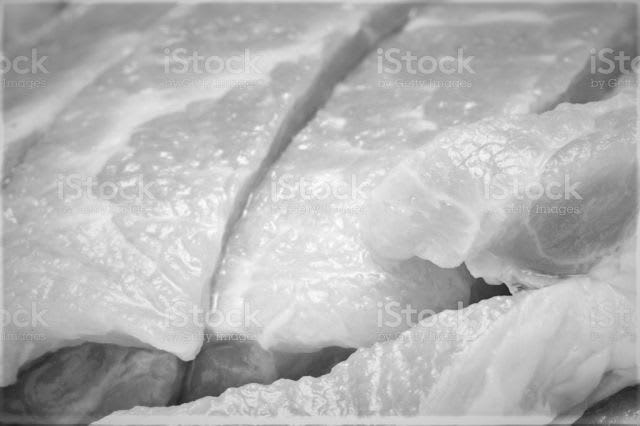The End of Pork
Hi there. I'm trying to share more of my writing these days. Recently, I enrolled in an online fiction class specifically focusing on the use of fragments, or fragmented writing (see: Jenny Offill; Anelise Chen; Han Kang). I realize that I've always been drawn to the broken narrative, the authenticity of non-linear thought order. So in future TinyLetters you might see more of these fragments (and black-and-white photocopy images, like Xeroxes; I like those too).
I wrote the following text a few months ago. I apologize if this weirdness isn't what you were looking for (the unsubscribe button should be somewhere in this email).
***
“Pork Prices Chopped in China Due to African Swine Fever” — Wall Street Journal
“China is starting to eat into its emergency reserves of pork” — CNN
“China’s pork prices surged 69.3% in September from a year ago” — CNBC
“All food production is exploitative”—Okja (2017)

Mother says to me: buy a catty of pork meat, make sure they grind it up nice and shiny, the butcher should throw in some skin, some fat, some gristle for bite. Get some bones, I will make a soup. Then, when your sister is home, we shall eat her too. What a feast we will have!
Imagine: all the recipe books in used books stores have cut-out pages. Someone has scrawled over the words “pork”—they take an x-acto knife and incised along the edges of a lump of belly fat, ribs or the interior of a split dumpling. There might be forums about its texture, taste, longings for grandma’s home-cooked meals. Artificial intelligence machines read these florid descriptions, output a series of DNA strands in a perfect, spherical patty that jets out an unnatural juice when pressed down onto a grill. A new pork-adjacent jelly is developed. You can melt it in a fancy bain marie, pour it all over your vegetables, feel a strange and spiritual power in the aroma of something that no longer exists.
P is for pig; pork; pei dan sau yuk jook. In all Chinese dialects, the term for pork is simply an extension of the same word for pig, the incision between sentient animal and the steaming meal on the cloth table eradicated. It can never be autonomous from its production value; it is born a pig and then it is pig meat. Just like that. Just like me and you.
Sister says to me: Sister, am I to be eaten? What glad news. Please, use the nice blender. It has the highest setting; I will soon be smoother than a milkshake, and my fingers will melt down like pork fat on a soft bun.
It is reported that the favorite meal of Chinese author Lu Xun was rice with braised mushrooms and pork. In a sunless square beneath an overpass in Causeway Bay in Hong Kong, women mutter to us a mysterious eight-step curse, rubbing a shine of pork fat onto a paper tiger, Bai Hu, a deity whose violent hunger can only be sated by this specific offering.
Husband says to me: Wife, let’s eat our son tonight. He must be so delicious; he hasn’t even learned to speak yet.
The pig, snout and trotters through gelatinous tail, a symbol. Fatty and pink, it exudes a picture of chimeric wealth; we transpose our desires onto it, we eat it. (Take a zoomed in photograph of a pig’s belly, what do you see? Would you see your own trickle of faint hairs, the translucent elastic surface an image of your own?) In Diary of A Madman, Lu Xun wrote of a man-eating society. Have we consumed ourselves to extinction? The end of things, the end of things.
It is, perhaps, the most forgiving of our staple proteins, folded into buns and dumplings, embraced openly in the sea-heavy library of Cantonese cuisine, as ubiquitous as the smattering of grass-green scallions that are tossed atop each bowl of noodles.
Daughter says to me: Mother, it’s time for you. Yum!